3 is to bring the smash TV hit Lost to the small screen. Following a deal between the UK’s largest video mobile network, Buena Vista International Television (BVITV) and Walt Disney Internet Group (WDIG), divisions of The Walt Disney Company Ltd, a mobile audience of over 3.2 million will be able to watch show recaps and previews of the action from Channel 4’s top-rated series. This is The Walt Disney Company’s first mobile video content agreement in Europe.
Lost is a gripping series which follows the survivors of a plane crash, stranded together on a remote, hostile island. As the group of strangers work together to create order in their makeshift community, and to stay alive, there appear to be darker forces at work around them. The show makes its debut over mobile this week.
3’s service includes 2-3 minute recaps of every episode, available for the length of the series, so fans can catch up on the plot at any stage, plus behind the scenes interview and previews of the next episode. Each clip will cost 50p.
Lost is the latest prime time series to be made available on 3, following Big Brother, Celebrity Big Brother, I’m a Celebrity and the X factor.
Already, millions of viewers hooked on Lost are debating conspiracy theories, scrutinising the characters and speculating on the plot’s twists and turns.
Graeme Oxby. 3’s Marketing Director, said: It’s compulsive, addictive television that gets people talking – it’s exactly the sort of TV our customers will watch.
“Every one of our 3.2million customers has a TV in their pocket. This new service means our customers will never be behind the plot and can keep on top of the action, wherever they are.”
Tom Toumazis, executive vice president & managing director, BVITV EMEA said: “Lost is BVITV’s fastest-ever selling, most successful TV series, having been licensed by us to 183 territories worldwide on TV – now being licensed for the first time on to mobile.
“We are sure that its ever-growing UK fanbase will ensure its success on mobile – the addictive, action-packed nature of the show lends itself particularly well to this format, as fans need to watch carefully to unravel the many mysteries within the show.”
“Mobile is rapidly emerging as a new entertainment platform and already has tremendous reach,” said Attila Gazdag, vice president and managing director of Walt Disney Internet Group, Europe. “Our strong brands have translated extremely well to this new platform and we’re pleased to be offering video, especially of such a great show, to broaden our mobile offerings.”
 Yo! Yo! Yo! Word! The Associated Press are getting hip and launching a news service for da yoot. Wicked, innit?!
Yo! Yo! Yo! Word! The Associated Press are getting hip and launching a news service for da yoot. Wicked, innit?! So far, more than 100 newspapers have signed up for asap, with the option to use the content for their online editions, print editions or both.
So far, more than 100 newspapers have signed up for asap, with the option to use the content for their online editions, print editions or both. The Economist is a publication that we regard highly. It’s not for nothing that they gained a strong reputation. Sadly a recent piece on the Digital Home let them down.
The Economist is a publication that we regard highly. It’s not for nothing that they gained a strong reputation. Sadly a recent piece on the Digital Home let them down. This was repeated with halls and halls of identikit stands. Remove the brand names and it would have been a challenge to tell them apart.
This was repeated with halls and halls of identikit stands. Remove the brand names and it would have been a challenge to tell them apart. Where The Economist got it wrong #2 – MSMedia Centre PCs are a failure
Where The Economist got it wrong #2 – MSMedia Centre PCs are a failure After an encouraging response from listeners, Virgin Radio has announced that it will be making its Sunday afternoon programme ‘The Tim Lovejoy Show’ available as a podcast.
After an encouraging response from listeners, Virgin Radio has announced that it will be making its Sunday afternoon programme ‘The Tim Lovejoy Show’ available as a podcast.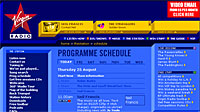 Lovejoy’s sports and entertainment show is broadcast weekly from 4pm to 7pm, and Virgin have said that they’ll make the “best bits” available for consumers to download to their MP3 players from 28th August.
Lovejoy’s sports and entertainment show is broadcast weekly from 4pm to 7pm, and Virgin have said that they’ll make the “best bits” available for consumers to download to their MP3 players from 28th August. Warner Music Group has announced a new digital music distribution mechanism based on downloads rather than physical media like CDs.
Warner Music Group has announced a new digital music distribution mechanism based on downloads rather than physical media like CDs. With far lower production costs, Bronfman claimed that the e-label will give recording artists a “supportive, lower-risk environment” (I think this means “less cash from the record company”) without as much pressure for huge commercial hits – something that could benefit artists with a more “selective audience”.
With far lower production costs, Bronfman claimed that the e-label will give recording artists a “supportive, lower-risk environment” (I think this means “less cash from the record company”) without as much pressure for huge commercial hits – something that could benefit artists with a more “selective audience”.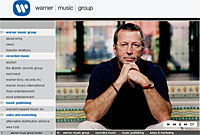 Bronfman called on the technology industry to work on digital rights management (DRM) standards, arguing that compulsory licensing – with support from P-to-P vendors – would set a price for downloaded music while forcing music companies to make their products available online to P-to-P users.
Bronfman called on the technology industry to work on digital rights management (DRM) standards, arguing that compulsory licensing – with support from P-to-P vendors – would set a price for downloaded music while forcing music companies to make their products available online to P-to-P users.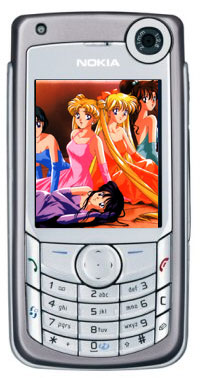 Sony Pictures Entertainment is set to triple the number of comic books it offers as mobile downloads in Japan, making the company the number one provider of “manga” downloads.
Sony Pictures Entertainment is set to triple the number of comic books it offers as mobile downloads in Japan, making the company the number one provider of “manga” downloads. Sony intends to offer more comic books than competitors like NTT Solmare, (unit of telecom firm NTT) and Toppan Printing.
Sony intends to offer more comic books than competitors like NTT Solmare, (unit of telecom firm NTT) and Toppan Printing.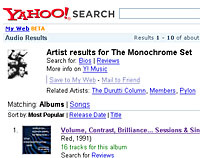 Yahoo is testing a new Audio search facility to let users find audio files on the Web.
Yahoo is testing a new Audio search facility to let users find audio files on the Web.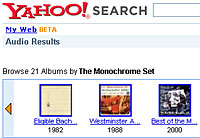 Although the service is still in beta we were impressed with its speedy and simple interface: typing in the name of one of my (sadly) obscure old punk songs immediately brought up the album details, a list of download locations and links to reviews and other released albums.
Although the service is still in beta we were impressed with its speedy and simple interface: typing in the name of one of my (sadly) obscure old punk songs immediately brought up the album details, a list of download locations and links to reviews and other released albums. Online broadband film distributer, and latterly video content provider CinemaNow, has announced that they will be carrying some high-definition from HDNet on their Internet to PC delivery platform. It’s the first time that HDNet’s content has been made available on-demand through an online broadband service.
Online broadband film distributer, and latterly video content provider CinemaNow, has announced that they will be carrying some high-definition from HDNet on their Internet to PC delivery platform. It’s the first time that HDNet’s content has been made available on-demand through an online broadband service. Mark Cuban, the CEO of HDNet, has been slowly gathering HD content to the point where HDNet now lay claim to having more original high-definition content than any other network. We at Digital-Lifestyles.info have had our eye on him for years, as we think he’s a smart cookie. He not only spots upcoming trends, but turns them into businesses. He made a fortune when he sold broadcast.com to Yahoo for billions of dollars at the peak of the market.
Mark Cuban, the CEO of HDNet, has been slowly gathering HD content to the point where HDNet now lay claim to having more original high-definition content than any other network. We at Digital-Lifestyles.info have had our eye on him for years, as we think he’s a smart cookie. He not only spots upcoming trends, but turns them into businesses. He made a fortune when he sold broadcast.com to Yahoo for billions of dollars at the peak of the market.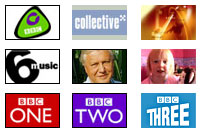 The BBC has announced a pilot scheme to premiere some new TV programmes before they are broadcast on over traditional channels.
The BBC has announced a pilot scheme to premiere some new TV programmes before they are broadcast on over traditional channels. Jana Bennett, The BBC’s Director of Television, said: “The broadband premiere of The Mighty Boosh is a significant step forward in offering our audiences even greater value in a changing television world.
Jana Bennett, The BBC’s Director of Television, said: “The broadband premiere of The Mighty Boosh is a significant step forward in offering our audiences even greater value in a changing television world. There’s something of a stampede starting up of companies ready and willing to experiment with video over broadband, with BT announcing that it planned to begin trials of
There’s something of a stampede starting up of companies ready and willing to experiment with video over broadband, with BT announcing that it planned to begin trials of  Apple and the Sundance Channel have signed a deal that will make content from the cable network exclusively available as podcast downloads from the Apple iTunes Web site next month, according to AdAge.
Apple and the Sundance Channel have signed a deal that will make content from the cable network exclusively available as podcast downloads from the Apple iTunes Web site next month, according to AdAge. One of the first iTunes podcast features scheduled for download from the Sundance Channel will be The Al Franken Show who is, apparently, an Air America talk show host.
One of the first iTunes podcast features scheduled for download from the Sundance Channel will be The Al Franken Show who is, apparently, an Air America talk show host.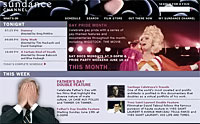 The feature in AdAge also reports that Sundance will receive Apple’s post-production editing equipment and expertise as part of the barter deal, with the two companies likely to collaborate on the Apple retail level in the future.
The feature in AdAge also reports that Sundance will receive Apple’s post-production editing equipment and expertise as part of the barter deal, with the two companies likely to collaborate on the Apple retail level in the future.